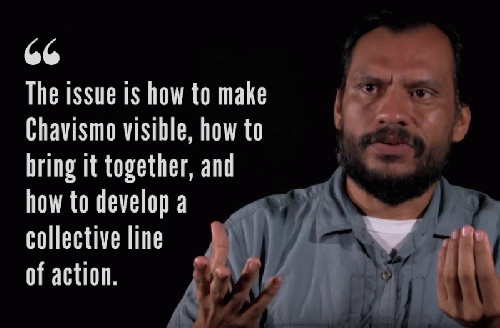Republished from Venezuelanalysis
An intellectual committed to the communal project talks about the contradictions that the popular movement is facing in Venezuela today.

Rebuilding the Hegemony of Chavismo: A Conversation with Gerardo Rojas (Part I)
(Image by venezuelanalysis website) Details DMCA
Gerardo Rojas is a Barquisimeto"based Chavista intellectual and blogger. His work as an organizer began in the early 1990s, when he was in middle school. Later in that decade, Rojas participated in the occupation of a building in the barrio where he was born, which became a community center and later, in 1998, the first community radio in Venezuela. Rojas was one of the founders of Voces Urgentes in 2002, a communication collective, and participated in the organization of one of the first urban communes, Ataroa Socialist Commune, in 2007. More recently, he was vice minister at the Ministry of Communes.
*
In recent years, you have focused on the issue of communal and popular organization, examining the correlations of forces and bringing to the forefront a debate about the pending tasks for the popular movement. One of the tasks you identify is to resurrect Chavez's core proposal, in the face of hegemonic currents in the government. The government currently proposes that the way out of the crisis will be achieved with more capitalism instead of more communes and more socialism.
*
For me, Chavismo is the synthesis of Comandante Chavez's thinking, which was itself rooted in the interests and experiences of the popular movement and of the working people but also grew out of the revolutions of the world, and the thinking, theory and imaginary of the Left.
Three elements synthesize his thinking. The first is The Blue Book [short book written in 1991 by Hugo Chavez, in which he presents his views on history and democracy]; the second is Alo Presidente Teorico NÂ degrees 1 [2009 speech]; and the third is the Strike at the Helm speech [2012]. In those three milestones, we find no more and no less than a clarion call for self"government, direct democracy, social control of the public sphere, and development at a territorial or local level. Yet we also find the outline of a national system that would bring all this together.
With those elements at hand, it is not hard to see what line we should pursue in our struggle, a path for popular action that goes hand in hand with a governance model committed to participatory and protagonist democracy, which for us is nothing other than Bolivarian socialism. That is a synthesis of Chavez's legacy.
When one reads The Blue Book, which precedes Chavez's electoral victory [1998], one is surprised to find direct, participatory democracy and self-government at its core. We are talking about the 1990s that is when Chavez wrote it. Direct democracy and self-government, were always at the core of the Bolivarian Revolution. However, with time, experience, the practice of governing, the emergence of internal contradictions, together with advances and setbacks, the proposal gained precision and became a fully outlined integral project.
Later, in the Alo Presidente Teorico NÂ degrees 1 speech, we can see Chavez consolidating the mature proposal. The discourse touches upon various experiences of popular power, beginning with the Mesas Tecnicas de Agua[barrio-level organizations for getting access to running water] and Comites de Tierra Urbana [Urban Land Committees, formed in the early days of the Bolivarian Process to struggle for urban land titles]. However, in that speech, we find an important leap forward in the proposal regarding territorial organization and popular self"government. The new proposal comes out of historical experiences, and also from a tangible, immediate experience: the pueblo had already demonstrated its capacity to organize in communal councils, opening up the real possibility of efficient and transparent self"governance and collective control. The potential to go further, now crystallizes in the proposal of the commune.
In addition to the Alo Presidente Teorico NÂ degrees 1 landmark speech, we also have the last political address of Chavez, the testament which he leaves us before he goes to Cuba to address serious medical problems. That is the speech known as Strike at the Helm, which he delivered in the first cabinet meeting shortly after the 2012 elections and was publically broadcast nationwide. There Chavez severely criticized his ministerial team and their administrative methods. But he didn't just question the ministers, he also made some concrete proposals, based on the collective experience so far and also based on his own analysis, and taking into account the correlation of forces at that moment.
Many who talk about Strike at the Helm limit its scope to the "Commune or nothing" slogan, and that of course is key it is one of the sentences that best synthesizes Chavez's thinking but "Commune or nothing" was essentially already there in Alo Presidente Teorico NÂ degrees 1, where the communes were conceived as the base for the territorial development of socialism. However, the commune as expressed in Strike at the Helmtranscends the earlier, merely local proposal, and its scale now becomes national. Thus, Chavez now introduces mechanisms of political, administrative, and institutional coordination regarding the key issue of planning that range from the communal territory (the "commune" as expressed in the popular power Laws) to the national scale.
In this speech, Chavez talks about the diverse modules, territorial units, and stages of popular development. He talks about weaving socialism into the fabric of the whole country, with the commune as the base, and the emergence of an economy based on social property. So there, in Strike at the Helm, Chavez acknowledges problems and makes contributions which, as I just said, take for granted the commune as a project on a national scale... He also envisions the project growing from the communal council to the commune, then to the communal cities, and even later to the developmental districts and developmental axes all the way up to the communal state. In other words, Chavez imagines a process that goes from the local to the regional and then to the national, recognizing that planning is very important.
The coming together of the local projects of popular power (the communes) with the regional and national governments must go through a democratic debate in which there is planning process and people agree on the objectives. That is why the Homeland Plan [2012] is also a key to understanding the communal proposal. It is a guide for a collective process of planning and action, where revolutionary imagination and the political project feed into a plan.
(Note: You can view every article as one long page if you sign up as an Advocate Member, or higher).





